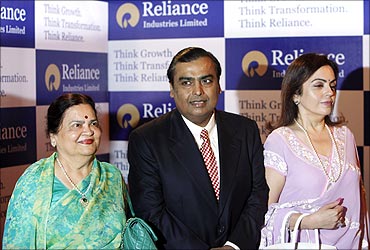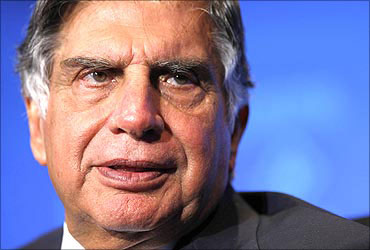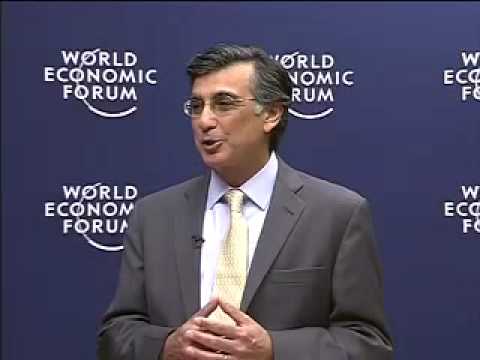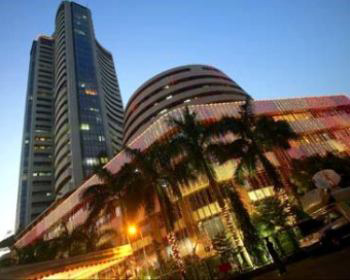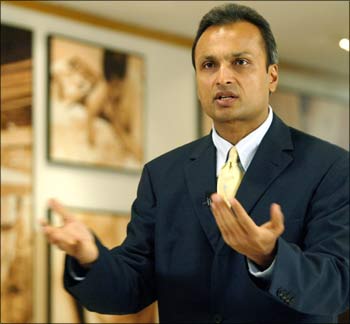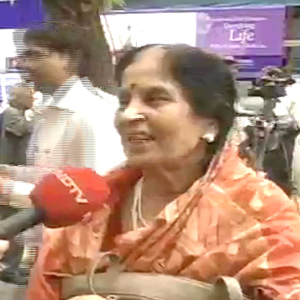 | « Back to article | Print this article |
When Ambani lost his cool and Tata was embarrassed
"Mr Chairman Sir," the shareholder began, as Mukesh Ambani looked at him intensely from the dais at the annual general meeting of Reliance Industries, last month.
For a moment, everyone thought the question would revolve around the company's tryst with destiny in the KG basin.
But the shareholder obviously had better things to worry about. "Can we have coupons for chocolate wafers, instead of ice creams in future," he asked. Ambani was at his charming best: RIL, he said, would move with the changing times and explore the option.
Yet another suggested RIL should turn its Indian Premier League franchise, Mumbai Indians, into a subsidiary and list it on the bourses.
Click NEXT to read on . . .
When Ambani lost his cool and Tata was embarrassed
Before Ambani could think of an answer, the shareholder volunteered the reason for his 'business plan': This, he said, would ensure that shareholders got passes for cricket matches. "We can do without dividends if we get passes for the matches," he said.
The RIL AGM is just one example of how most shareholders make a mockery of the real purpose of these meetings.
Consider the AGMs of the debt-laden United Breweries where the main request from shareholders to chairman Vijay Mallya is simple: "Please give us Kingfisher calendars".
Or, take the Tata Consultancy Services AGM held this month. After quibbling for soft drinks, many managed to embarrass chairman Ratan Tata by commenting on his single status.
Other shareholders didn't fare better: One of the most-asked questions was how much TCS spent in printing the well-produced annual report. Tata, a veteran of AGMs, has, of course, faced more such gems in the past.
Click NEXT to read on . . .
When Ambani lost his cool and Tata was embarrassed
In the AGM following the launch of the Nano in 2008, shareholders wanted to know whether they would be offered "loyalty discounts" on purchase of the small car.
There's more. Hindustan Unilever chairman Harish Manwani, who is generally never at a loss for words, was stumped when a lady shareholder wanted to know whether he used HUL's products as she found his skin "beautiful".
And what does one make of the Procter & Gamble Hygiene and Healthcare AGM held last year when a shareholder, Ashalata Maheshwari, recited a long poem describing how dapper managing director Shantanu Khosla looked with his hair worn long.
Though it's mostly fun and games all the way, things do turn ugly at times. Ambani, for example, rarely loses his temper in public. So it was rather surprising when during the AGM in 2008, he lost his cool when a shareholder accused him of not keeping the promises made at AGMs in the past and also questioned him on his newRs 4,000-crore (Rs 40 billion) home in Mumbai and his new aircraft.
Click NEXT to read on . . .
When Ambani lost his cool and Tata was embarrassed
"You are lying. If you don't like this company, you may sell your shares," was his curt advice to the shareholder.
Veteran observers say if AGMs have degenerated, companies also should take the blame. Kisan Ratilal Choksey, who has attended countless AGMs for over 50 years, says, with the number of shareholders increasing at AGMs, companies that wanted to pass certain controversial decisions started providing snacks and doling out gifts.
"In many cases, gifts were distributed while the AGM was going on. While shareholders were snacking and collecting gifts, the management would pass resolutions with voice votes," Choksey says.
There is still a handful of shareholders who take AGMs seriously and do their homework. For instance, at the RIL AGM this year, a few shareholders expressed concerns that while many customers were ready to pay over $14 per unit for spot LNG, RIL was charging only $4.2 per million British thermal unit (mBtu).
Click NEXT to read on . . .
When Ambani lost his cool and Tata was embarrassed
A few shareholders also expressed concerns that RIL's shares had underperformed and sought better returns on their investment.
In a similar incident, a well-read shareholder posed some tough questions to Anil Ambani at the Reliance Infrastructure AGM. He questioned the company's revenues, balance sheet reportage and performance.
"It has been six years since you took over BSES. Why have you not put up even one megawatt of power, since then," he asked, even as other shareholders protested against the tough questions. Ambani was visibly angry when the questioning ended, but chose not to answer.
Choksey says the trend has always been that of a mixed bag with AGMs witnessing both shareholder frolic and seriousness.
Click NEXT to read on . . .
When Ambani lost his cool and Tata was embarrassed
He even recalls attending the AGM of a cement company in South India in 1961. "The AGM was held in the company's office. There were hardly 25 shareholders attending the AGM. The management was surprised that a shareholder came all the way from Mumbai."
Choksey also talks about 'professionals AGM-attendees'. These breed of investors used to come with an intention to encash their support.
"Chairmen of companies began holding separate meetings with them a day before AGM to win their support.
Depending on the outcome of these meetings, these groups of shareholders would either pamper or embarrass the managements.
Many with a legal background were known for filing court cases also. This later developed into shareholders' activism," says Choksey.
Click NEXT to read on . . .
When Ambani lost his cool and Tata was embarrassed
Maheshwari, the AGM veteran who makes top honchos blush
For all those who attend annual general meetings of blue chip companies, Asha Lata Maheshwari needs no introduction.
With a penchant for old film songs and shayari , she has made even the best of chairmen and managing directors blush when she compares them with the moon and flowers.
One among her all time favourites is Cairn India's chief executive officer, Rahul Dhir, who she has compared with the moon on several occassions. In fact, at one of the AGMs, she asked Dhir to remove the flower vase kept in front of him so that she could have a clear view of Dhir. Though embarassed, he obliged.
Her poetic streak apart, Maheshwari is no flippant woman. She's an astute investor with shareholding in close to 1,000 companies in India. That takes her net worth beyond Rs 4 crore (Rs 40 million).
Click NEXT to read on . . .
When Ambani lost his cool and Tata was embarrassed
She also runs her own company called Market analysis and promoters. "It has been more than 50 years since I have been investing. I took after my father-in-law who was into trading. My family is also in trading," she says.
Maheshwari began trading in shares in her late 20s. Now, 75, she says her first investment was in HDFC Ltd. She has not exited completely from any of the companies that she has invested in, so far.
"The only company I have exited so far was Grasim Industries. My father-in-law had gifted me 1,000 shares. During my daughter's wedding I had to sell these," she adds.
Click NEXT to read on . . .
When Ambani lost his cool and Tata was embarrassed
A typical day for Maheshwari begins with the day's newspapers and market news on business news channels. "I study the details of a company after the markets close or late in the night. When I started investing it was based on newspaper and brokerage reports. Now TV also helps," she says.
Maheshwari's reason to attend AGMs is to meet the top management of the companies. "There will always be shareholders who create a ruckus and many just repeat the company's performance while discussing it. But AGMs are the only time that you get to meet the top management of the companies."
For instance, she pleaded with Mukesh Ambani during this month's RIL AGM: "When the EPS is over Rs 60, a dividend payout of Rs 8 seems too less and the company should pay a bonus to shareholders next year."
